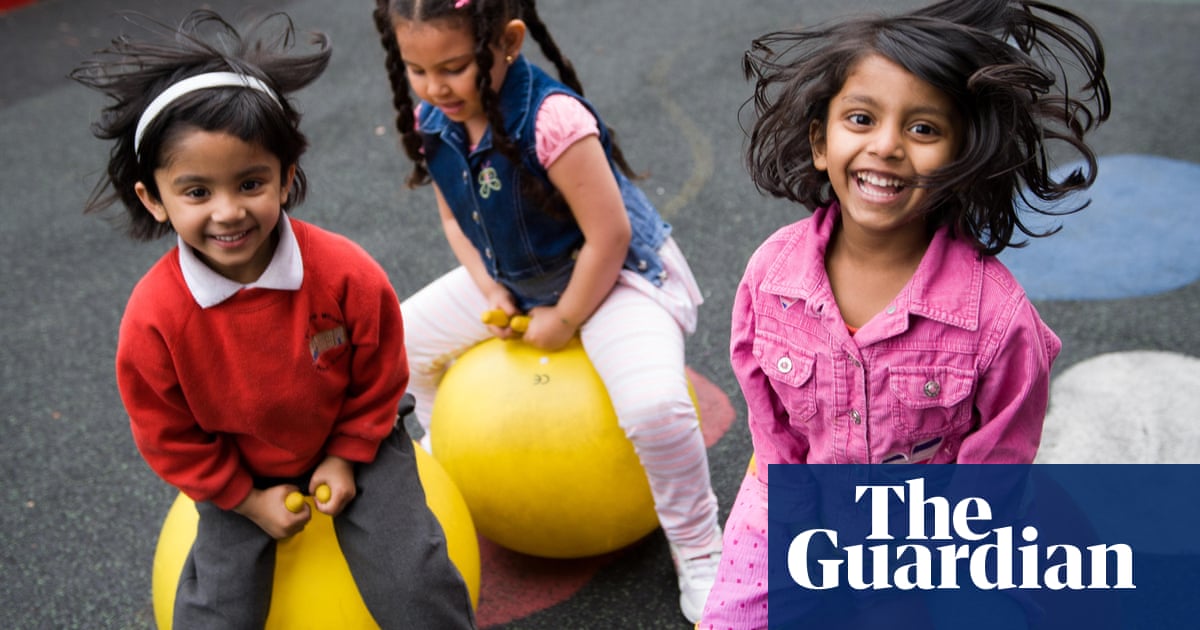Children are growing up “sedentary, scrolling and alone” because of a dramatic decline in play in their lives, say a panel of experts who have spent a year investigating play and childhood in England.
The government should ban “no ball games” signs, raise the digital age of consent to 16, restore play to the education system and put in placea statutory “play sufficiency duty” for local authorities, say the panel, who are urgently calling for a cross-departmental national play strategy backed by an annual £125m of funding.
The experts leading the Raising the Nation Play Commission report, the entrepreneur Paul Lindley and former children’s commissioner Anne Longfield, say that failure to provide children with the spaces they need outside the home is leading to a huge loss of outdoor play and independence.
Lady Longfield, executive chair of the Centre for Young Lives, said: “Too many of our children are spending their most precious years sedentary, doomscrolling on their phones and often alone, while their health and wellbeing deteriorates. It is no coincidence that the least happy generation, the generation with the highest rates of obesity and rising ill health, is the generation that plays less and less.
The commission brought together 19 experts, from doctors to play campaigners, to act as commissioners and then held a series of evidence sessions hearing from children, parents and professionals around the country.
One of the key arguments experts made is that the rise in time spent on smartphones and gaming devices is being driven not just by the ubiquity of screens themselves, but by the loss of alternative ways and places for children to play.
From traffic-dominated streets to the huge decline in youth clubs and loss of funds for playgrounds, experts pointed to the decline in neighbourhood spaces where children could actually play freely.
Ingrid Skeels, co-director of Playing Out, was one of the 19 commissioners and has spent 15 years campaigning for children to have safer streets to play on.
“The findings here confirm what we have been warning for years – children are being driven indoors by a lack of safe spaces to play, move and socialise freely. We can’t just blame overprotective parents and screens – we have to make the outside world a place children can play in real life. It’s brilliant to have this in-depth, rigorous report confirm what we have heard from families for years, now it’s time for action.”
Children themselves also gave their thoughts to the commission through a youth panel.
A girl in year 7 in London told the commission that children should go outside and be exposed to some risks, saying: “If you don’t let your child out at some point, your child is never gonna learn … parents should give their children a bit more freedom and free will so that children will be aware of the real world.”
Young people described local play spaces that are limited, costly, or have been removed. “There’s not much to do and the things that there are cost a lot of money,” said one panellist.
Children also repeatedly told the panel that there isn’t enough time in the schoolday to play, and described how school work dominated life outside too. “The reason we don’t have time to play”, one year 7 child said, “is because we’ve got stress, we’re doing homework. All the homework Monday to Friday, we’ve got massive lines […] at lunch and break with barely any time to do anything. I feel like we should have a bit longer so we have more time to go outside and stuff”.
Sign up toHeadlines UK
Get the day’s headlines and highlights emailed direct to you every morning
after newsletter promotion
Last yearthe Guardian reportedthat shrinking outside space at schools and less time in the day for play are having a damaging impact on children’s wellbeing and physical health.
The chairs and commissioners also looked at “better” practice in countries where children play more widely. In Finland the commission met the Ministry of Education and Culture, who described how “play is a backbone throughout the schoolday as it is in childhood more widely”. Guidance in Finland recommends that children should have a 15-minute break for every 45 minutes of learning, with studies showing shorter lessons with more frequent breaks increase attentiveness.
Lindley said:“[A]s this report shows, in England we’ve made it incredibly hard for children to play.
“We have visited countries where children’s play is at the heart of government strategy – embedded across education, health, local government and beyond – because it is seen as the central fabric of life. All of this is within our grasp in this country, but England needs a national play strategy to make it happen.”
Asked about the report, a government spokesperson said: “We recognise the vital importance of play and access to nature as part of children’s development and wellbeing as we strive to create the healthiest and happiest generation of children ever.
“Through our ‘plan for change’, we are setting young people up to achieve and thrive – both inside and outside the classroom. We have given hundreds of thousands of children the tools to turn their grey school spaces green as part of our National Education Nature Park, we are opening up grassroots sports to all with £100m investment in facilities.”
